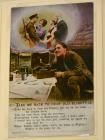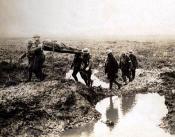Here I am, here I am,
Patted and petted as though I were
A real live lord
In the convalescent ward.
It's a treat, lots to eat.
Who was it said we were short of meat?
But I felt queer
When I first got over here.
"What is the matter with you?" the M. O. said.
I said as they lifted me in my little bed:
I've a bit of a blighty one, but nothing to speak of,
A bit of a blighty one, that's all.
All through a splinter from a four-point-two,
I'm in blue, but I'm never feeling blue.
I'm having a cootchie time but nothing to speak of.
I'm treated like a long-lost son.
When the saucy little nursie
Tucks me in and calls me Percy,
Oh, I'm glad I've got this bit of a blighty one.
No complaints, no complaints.
Ev'ryone's satisfied, no complaints.
Just ask my chums
And you'll hear them all say 'Thumbs!'
Yesterday Lady Grey
Brought us some chocolates. Oh, I say!
Such lovely chocs!
We each had a three-pound box.
We guzzled those sweets till our faces all turned white,
Then, oh, what a casualty list there was that night!
I've a bit of a blighty one, but nothing to speak of,
A bit of a blighty one, that's all.
All through a splinter from a four-point-two,
I'm in blue, but I'm never feeling blue.
I'm having a cootchie time but nothing to speak of.
I'm treated like a long-lost son.
When they mop my brow with sponges
And they feed me on blancmanges,
Oh, I'm glad I've got this bit of a blighty one.
I've a bit of a blighty one, but nothing to speak of,
A bit of a blighty one, that's all.
All through a splinter from a four-point-two,
I'm in blue, but I'm never feeling blue.
I'm having a cootchie time but nothing to speak of.
I'm treated like a long-lost son.
When I think about my dugout
Where I dare not poke me mug out,
Oh, I'm glad I've got this bit of a blighty one.
Patted and petted as though I were
A real live lord
In the convalescent ward.
It's a treat, lots to eat.
Who was it said we were short of meat?
But I felt queer
When I first got over here.
"What is the matter with you?" the M. O. said.
I said as they lifted me in my little bed:
I've a bit of a blighty one, but nothing to speak of,
A bit of a blighty one, that's all.
All through a splinter from a four-point-two,
I'm in blue, but I'm never feeling blue.
I'm having a cootchie time but nothing to speak of.
I'm treated like a long-lost son.
When the saucy little nursie
Tucks me in and calls me Percy,
Oh, I'm glad I've got this bit of a blighty one.
No complaints, no complaints.
Ev'ryone's satisfied, no complaints.
Just ask my chums
And you'll hear them all say 'Thumbs!'
Yesterday Lady Grey
Brought us some chocolates. Oh, I say!
Such lovely chocs!
We each had a three-pound box.
We guzzled those sweets till our faces all turned white,
Then, oh, what a casualty list there was that night!
I've a bit of a blighty one, but nothing to speak of,
A bit of a blighty one, that's all.
All through a splinter from a four-point-two,
I'm in blue, but I'm never feeling blue.
I'm having a cootchie time but nothing to speak of.
I'm treated like a long-lost son.
When they mop my brow with sponges
And they feed me on blancmanges,
Oh, I'm glad I've got this bit of a blighty one.
I've a bit of a blighty one, but nothing to speak of,
A bit of a blighty one, that's all.
All through a splinter from a four-point-two,
I'm in blue, but I'm never feeling blue.
I'm having a cootchie time but nothing to speak of.
I'm treated like a long-lost son.
When I think about my dugout
Where I dare not poke me mug out,
Oh, I'm glad I've got this bit of a blighty one.
Contributed by Bernart Bartleby - 2015/12/27 - 20:48
×
![]()
Note for non-Italian users: Sorry, though the interface of this website is translated into English, most commentaries and biographies are in Italian and/or in other languages like French, German, Spanish, Russian etc.





Scritta da Herman Darewski & Arthur Wimperis
Cavallo di battaglia di Matilda Alice Powles (1864-1952), in arte Vesta Tilley, cantante inglese di music-hall, assai famosa in quegli anni. Nei suoi numeri si presentava travestita da uomo.
Testo trovato su Monologues - Music Hall
Sebbene Vesta Tilley, come tanti altri artisti, fosse subito divenuta un megafono per la propaganda volta all’arruolamento, nonchè un’affezionata degli spettacoli per le truppe, questa canzone da lei interpretata non racconta una storia di eroismo, tutt’altro.
Qui ad un “Tommy” è riuscito il colpaccio di togliersi dalle trincee e da morte quasi sicura grazie ad una ferita nè troppo lieve nè troppo grave, una cosiddetta “blighty wound”, dove - according to en.wikipedia - “blighty” è termine che non deriva dal negativo “blight” - ruggine, degrado, rovina, morìa - ma da bilayati, o vilayati, parola in lingua Hindustani che significa “straniero” e con cui erano chiamati in India i colonialisti inglesi. E costoro la fecero propria, cosicchè “Dear old Blighty” venne a designare la cara vecchia madrepatria per tutti gli inglesi che si trovavano da dominatori o combattenti in terre altrui.
Si pensi che “Blighty” fu persino il titolo originale (poi cambiato in “Parade”) di un giornaletto settimanale ad uso e consumo delle truppe inglesi. Pubblicato tra il 1916 ed il 1920 e poi caduto in disgrazia, fu rilanciato - ma guarda un po’!?! - nel 1939...
Il soldatino protagonista si trova ricoverato in ospedale nella sua home-sweet-home, curato da avvenenti infermiere, ricostituito a suon di bistecche, vezzeggiato come un eroe, con tanto di scatole di cioccolatini offerti dalla nobildonne: “E pensare che fino a ieri ero sprofondato in quella trincea da dove non avevo il coraggio di tirar fuori la testa!”. E quando gli chiedono come si è procurato la ferita lui risponde evasivamente, manifestando solo tutta la sua gioia per essere venuto fuori dall’inferno e ritrovarsi a casa, in paradiso.
Ovviamente non si dice che la “blighty wound” il nostro se la sia procurata da solo, ma penso che proprio questa fosse la percezione del pubblico...
D’altra parte il ricorso all’autolesionismo fu pratica disperata assai comune nel carnaio della Grande Guerra e migliaia di soldati furono condannati per tentata diserzione o vigliaccheria davanti al nemico per essersi feriti deliberatamente da loro stessi, il classico colpo di fucile in un piede...